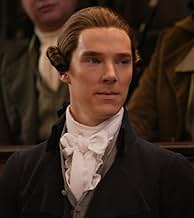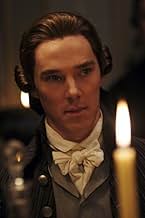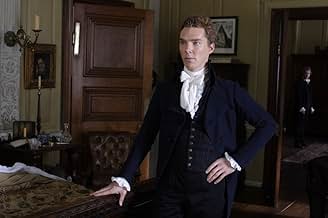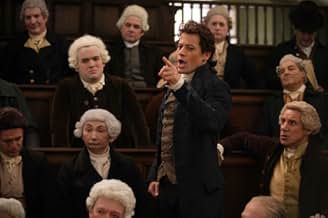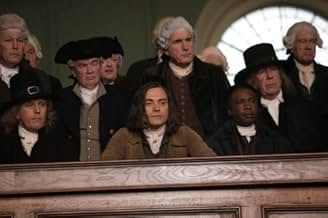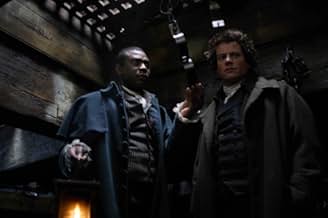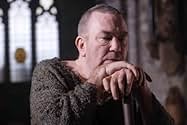IMDb-BEWERTUNG
7,4/10
26.188
IHRE BEWERTUNG
Füge eine Handlung in deiner Sprache hinzuThe idealist William Wilberforce maneuvers his way through Parliament, endeavoring to end the British transatlantic slave trade.The idealist William Wilberforce maneuvers his way through Parliament, endeavoring to end the British transatlantic slave trade.The idealist William Wilberforce maneuvers his way through Parliament, endeavoring to end the British transatlantic slave trade.
- Auszeichnungen
- 3 Gewinne & 6 Nominierungen insgesamt
Ciarán Hinds
- Lord Tarleton
- (as Ciaran Hinds)
Empfohlene Bewertungen
To see this well mounted but simplistic and worshipful bio-pic, one would think that William Wilberforce (and to a lesser extent, young Mr. Pitt) were the only members of Parliament to speak out against the war with America, then against the slave trade. Not so, folks - next time you're in Westminster Abbey, you might check out the large abolitionist monument dedicated someone whose fight against the slave trade predated that of Wilberforce and was widely recognized during his liftetime: Charles James Fox.
Yes, that same Fox so inaccurately identified in the film as a tame follower of Wilberforce, agonizing over the slavery question and finally swayed by the young man's eloquence. Truth is, Fox - whose pro-American, pro-French Revolution, anti-slavery and anti-absolute monarchy sentiments put him at odds with George III during nearly his entire political career - was a "phenomenon of the age" in the words of a contemporary, and one of Parliament's most eloquent speakers on a range of causes that certainly rivalled those of Wilberforce.
He was also only 10 years older than Pitt, something you'd never guess from the fright-wig makeup Michael Gambon wears.
You can understand why such scripting decisions are made: Wilberforce has to be young and sexy to be attractive, and his more priggish attitudes (he often urged Parliament to pass laws prohibiting all amusements on Sundays, and was appalled at what he deemed Fox's immorality: his drinking, gambling and womanizing) have to be eliminated. It's a shame, because Wilberforce was all the more interesting for being a complex human - but it's so much easier to make him terribly young, eager and dashing, and all other politicians of the day old and timid.
Other strange egregious errors: Fox was not a lord, nor would you find any lords among Wilberforce's fellows in the House; lords do not sit in the House of Commons. The character identified as the king's son, the Duke of Cumberland, would have been about 12 years old at the time of the movie's action. Pitt was prime minister for some 20 years, yet his cautious political trimming was at least partly responsible for the slave trade continuing as long as it did.
It was a pleasant enough film and rousing in parts, but I prefer my history more red-blooded and reflective of real human beings.
Yes, that same Fox so inaccurately identified in the film as a tame follower of Wilberforce, agonizing over the slavery question and finally swayed by the young man's eloquence. Truth is, Fox - whose pro-American, pro-French Revolution, anti-slavery and anti-absolute monarchy sentiments put him at odds with George III during nearly his entire political career - was a "phenomenon of the age" in the words of a contemporary, and one of Parliament's most eloquent speakers on a range of causes that certainly rivalled those of Wilberforce.
He was also only 10 years older than Pitt, something you'd never guess from the fright-wig makeup Michael Gambon wears.
You can understand why such scripting decisions are made: Wilberforce has to be young and sexy to be attractive, and his more priggish attitudes (he often urged Parliament to pass laws prohibiting all amusements on Sundays, and was appalled at what he deemed Fox's immorality: his drinking, gambling and womanizing) have to be eliminated. It's a shame, because Wilberforce was all the more interesting for being a complex human - but it's so much easier to make him terribly young, eager and dashing, and all other politicians of the day old and timid.
Other strange egregious errors: Fox was not a lord, nor would you find any lords among Wilberforce's fellows in the House; lords do not sit in the House of Commons. The character identified as the king's son, the Duke of Cumberland, would have been about 12 years old at the time of the movie's action. Pitt was prime minister for some 20 years, yet his cautious political trimming was at least partly responsible for the slave trade continuing as long as it did.
It was a pleasant enough film and rousing in parts, but I prefer my history more red-blooded and reflective of real human beings.
Most people probably have vaguely heard of William Wilberforce without knowing too much about his life. The power of his story, and the power of the central issue (the abolition of slavery), carries this movie that veers from artful to clumsy.
The movie can be confusing, as it moves back and forth between phases of Wilberforce's life. Often I found myself wondering for a few moments, "When is this?" Also, much of the political intrigue has to be inferred, since the backgrounds of the various players - particularly Wilberforce's adversaries - are not adequately explained.
However, the performances are quite good, some bordering on excellence. Some might argue that the villains are too simplistically presented, but on an issue like slavery, it is expected that the opposition would be completely unsympathetic (just as Nazis are rarely presented with any hint of sympathy).
I am sure the writers took some liberties with history. By the way, the tune we now associate with the hymn "Amazing Grace" did not become the melody for John Newton's famous lyrics until after Wilberforce's death.
I just watched this movie at a private screening for attendees of the National Prayer Breakfast in Washington, DC (clergy are a natural audience for this movie). The reception was favorable, but this was an audience for which the moralizing of the story would naturally resonate. I'm not sure it will attract a very broad audience - this is a movie that may well find its niche on DVD being shown in high school history classes and at church gatherings.
It is a nice, historical, period piece. It is (largely due to subject matter) reminiscent of "Amistad", with similar pacing.
Should you see it? It depends on whether you like this TYPE of movie. If this genre (historical drama) interests you, this is quite well-done. It might even inspire you to read more about Wilberforce. Go see it. If you are in search of movies that teach lessons about good values and perseverance in fighting for what's right, go see it.
But if you have no idea when the French Revolution occurred relative to our War of Independence, and if it doesn't come naturally to you to remember that the newborn U.S. was allied with France against Britain during that period - and if you don't care - this movie might not be your idea of a fun time.
If I were the producers, I would add one of those "scrolling text" historical introductions to the film before final release, though it is probably too late.
The movie can be confusing, as it moves back and forth between phases of Wilberforce's life. Often I found myself wondering for a few moments, "When is this?" Also, much of the political intrigue has to be inferred, since the backgrounds of the various players - particularly Wilberforce's adversaries - are not adequately explained.
However, the performances are quite good, some bordering on excellence. Some might argue that the villains are too simplistically presented, but on an issue like slavery, it is expected that the opposition would be completely unsympathetic (just as Nazis are rarely presented with any hint of sympathy).
I am sure the writers took some liberties with history. By the way, the tune we now associate with the hymn "Amazing Grace" did not become the melody for John Newton's famous lyrics until after Wilberforce's death.
I just watched this movie at a private screening for attendees of the National Prayer Breakfast in Washington, DC (clergy are a natural audience for this movie). The reception was favorable, but this was an audience for which the moralizing of the story would naturally resonate. I'm not sure it will attract a very broad audience - this is a movie that may well find its niche on DVD being shown in high school history classes and at church gatherings.
It is a nice, historical, period piece. It is (largely due to subject matter) reminiscent of "Amistad", with similar pacing.
Should you see it? It depends on whether you like this TYPE of movie. If this genre (historical drama) interests you, this is quite well-done. It might even inspire you to read more about Wilberforce. Go see it. If you are in search of movies that teach lessons about good values and perseverance in fighting for what's right, go see it.
But if you have no idea when the French Revolution occurred relative to our War of Independence, and if it doesn't come naturally to you to remember that the newborn U.S. was allied with France against Britain during that period - and if you don't care - this movie might not be your idea of a fun time.
If I were the producers, I would add one of those "scrolling text" historical introductions to the film before final release, though it is probably too late.
The idealist William Wilberforce (finely played by Ioan Grufudd) along with Rhomas Clarkson (Rufus Sewell) and a group of anti-slave trade maneuver his way through Parliament, endeavoring to end the British transatlantic trade that would lead to a great victory . Wilberforce helped by his lifelong friend and future P. M . William Pitt (Benedict Cumberbatch) will fight to get their purports for social justice . Wilberforce encounters the inspiration in newfound love interest (Romola Garai) to rejuvenate the battle with new ideas . After many attempts to bring legislation forward over twenty years, he is eventually gets a bill being passed through Parliament in 1807, in which abolishes the slavery the British empire forever.
This is a bicentennial tribute to William Wilberforce and his parliamentary bill abolishing the slave trade . Thought-provoking and moving film dealing with interesting issues , including fidelity to historical accuracy and detailed moral battles . Ioan Gruffudd is good as obstinate , romantic parliamentary member who battles relentlessly injustices ; he does a dignified portrayal about a great man . The prestigious cast shows their awareness of the contemporary impact about the brooding themes and are allowed to step out of period detail . Special mention to Benedict Cumberbatch as his lifelong friend Prime Minister William Pitt and N' Dour realizing an enjoyable portrait of an ex-slave . All of them are quietly upstaged by Albert Finney as a repent , remorse ex-slaver . The motion picture was marvelously directed by Michael Apted , he's director, producer of several successes such as ¨The word is not enough¨, ¨Gorillas in the mist¨ , ¨Class action¨, ¨Nell¨, ¨Enigma¨ , ¨Chronicles of Narnia II : The voyage of Dawn Treader¨ among others . Rating : Above average and worthwhile seeing , the whole family will enjoy this film .It's a very likable biography and enormously appealing for students and scholars . Overall this is a really nice movie . If you are familiar with the history then you will like this splendid film .
This is a biopic well based on historical events , adding more details over the largely described in the movie are the following : William Wilberforce (24 August 1759 – 29 July 1833) was a British politician, philanthropist, and a leader of the movement to abolish the slave trade. A native of Kingston upon Hull, Yorkshire, he began his political career in 1780, eventually becoming the independent Member of Parliament for Yorkshire (1784–1812). In 1785, he underwent a conversion experience and became an evangelical Christian, resulting in major changes to his lifestyle and a lifelong concern for reform. In 1787, he came into contact with Thomas Clarkson and a group of anti-slave-trade activists, including Granville Sharp, Hannah More and Charles Middleton. They persuaded Wilberforce to take on the cause of abolition, and he soon became one of the leading English abolitionists. He headed the parliamentary campaign against the British slave trade for twenty-six years until the passage of the Slave Trade Act of 1807. Wilberforce was convinced of the importance of religion, morality and education. He championed causes and campaigns such as the Society for Suppression of Vice, British missionary work in India, the creation of a free colony in Sierra Leone, the foundation of the Church Mission Society, and the Society for the Prevention of Cruelty to Animals. His underlying conservatism led him to support politically and socially repressive legislation, and resulted in criticism that he was ignoring injustices at home while campaigning for the enslaved abroad.In later years, Wilberforce supported the campaign for the complete abolition of slavery, and continued his involvement after 1826, when he resigned from Parliament because of his failing health. That campaign led to the Slavery Abolition Act 1833, which abolished slavery in most of the British Empire; Wilberforce died just three days after hearing that the passage of the Act through Parliament was assured. He was buried in Westminster Abbey, close to his friend William Pitt.
This is a bicentennial tribute to William Wilberforce and his parliamentary bill abolishing the slave trade . Thought-provoking and moving film dealing with interesting issues , including fidelity to historical accuracy and detailed moral battles . Ioan Gruffudd is good as obstinate , romantic parliamentary member who battles relentlessly injustices ; he does a dignified portrayal about a great man . The prestigious cast shows their awareness of the contemporary impact about the brooding themes and are allowed to step out of period detail . Special mention to Benedict Cumberbatch as his lifelong friend Prime Minister William Pitt and N' Dour realizing an enjoyable portrait of an ex-slave . All of them are quietly upstaged by Albert Finney as a repent , remorse ex-slaver . The motion picture was marvelously directed by Michael Apted , he's director, producer of several successes such as ¨The word is not enough¨, ¨Gorillas in the mist¨ , ¨Class action¨, ¨Nell¨, ¨Enigma¨ , ¨Chronicles of Narnia II : The voyage of Dawn Treader¨ among others . Rating : Above average and worthwhile seeing , the whole family will enjoy this film .It's a very likable biography and enormously appealing for students and scholars . Overall this is a really nice movie . If you are familiar with the history then you will like this splendid film .
This is a biopic well based on historical events , adding more details over the largely described in the movie are the following : William Wilberforce (24 August 1759 – 29 July 1833) was a British politician, philanthropist, and a leader of the movement to abolish the slave trade. A native of Kingston upon Hull, Yorkshire, he began his political career in 1780, eventually becoming the independent Member of Parliament for Yorkshire (1784–1812). In 1785, he underwent a conversion experience and became an evangelical Christian, resulting in major changes to his lifestyle and a lifelong concern for reform. In 1787, he came into contact with Thomas Clarkson and a group of anti-slave-trade activists, including Granville Sharp, Hannah More and Charles Middleton. They persuaded Wilberforce to take on the cause of abolition, and he soon became one of the leading English abolitionists. He headed the parliamentary campaign against the British slave trade for twenty-six years until the passage of the Slave Trade Act of 1807. Wilberforce was convinced of the importance of religion, morality and education. He championed causes and campaigns such as the Society for Suppression of Vice, British missionary work in India, the creation of a free colony in Sierra Leone, the foundation of the Church Mission Society, and the Society for the Prevention of Cruelty to Animals. His underlying conservatism led him to support politically and socially repressive legislation, and resulted in criticism that he was ignoring injustices at home while campaigning for the enslaved abroad.In later years, Wilberforce supported the campaign for the complete abolition of slavery, and continued his involvement after 1826, when he resigned from Parliament because of his failing health. That campaign led to the Slavery Abolition Act 1833, which abolished slavery in most of the British Empire; Wilberforce died just three days after hearing that the passage of the Act through Parliament was assured. He was buried in Westminster Abbey, close to his friend William Pitt.
10tollini
I saw this film on October 10th, 2006 in Indianapolis. I am one of the judges for the Heartland Film Festival's Truly Moving Picture Award. A Truly Moving Picture "
explores the human journey by artistically expressing hope and respect for the positive values of life." Heartland gave that award to this film.
This is an inspiring story based on a legendary historical British Member of Parliament, William Wilberforce. During the late 18th century and early 19th century, a very young Wilberforce is elected to Parliament and over the course of several decades leads the fight to ban slavery.
Today this seems like an easy, obvious and intuitive decision. But this was not so 200 years ago. The film clearly explains the entrenched economic motives and the political motives for slavery. Wilberforce starts out as almost a force of one and slowly builds abolitionist momentum by brilliant oratory, political maneuvers, and appealing to his fellow man's better nature.
Ioan Gruffudd is totally believable in explaining to the audience the complexity and heroism of Wilberforce. Wilberforce over the course of his life is sickly and strong, religious and worldly, naive and romantic, and idealistic and practical.
During the course of this mostly political story, we get to see the immense cruelty shown to the captured Africans turned into slaves. We are shown the slave sailing ships where the captured are treated inhumanely and die of starvation, neglect, disease, and filth. Man's inhumanity to man was never worse.
Wilberforce is a great man of history even though mostly forgotten today. He respected his fellow man regardless of their station in life. He was always willing to sacrifice his life and health to help others. And his compassion and spirit was always masked by his humility. He is a hero for all ages.
This is a period piece and you are lost in it because of the attention to detail. The sets, art direction, and costumes allow you to totally suspend disbelief and be moved by the story.
FYI There is a Truly Moving Pictures web site where there is a listing of past Truly Moving Picture Award winners that are now either at the theater or available on video.
This is an inspiring story based on a legendary historical British Member of Parliament, William Wilberforce. During the late 18th century and early 19th century, a very young Wilberforce is elected to Parliament and over the course of several decades leads the fight to ban slavery.
Today this seems like an easy, obvious and intuitive decision. But this was not so 200 years ago. The film clearly explains the entrenched economic motives and the political motives for slavery. Wilberforce starts out as almost a force of one and slowly builds abolitionist momentum by brilliant oratory, political maneuvers, and appealing to his fellow man's better nature.
Ioan Gruffudd is totally believable in explaining to the audience the complexity and heroism of Wilberforce. Wilberforce over the course of his life is sickly and strong, religious and worldly, naive and romantic, and idealistic and practical.
During the course of this mostly political story, we get to see the immense cruelty shown to the captured Africans turned into slaves. We are shown the slave sailing ships where the captured are treated inhumanely and die of starvation, neglect, disease, and filth. Man's inhumanity to man was never worse.
Wilberforce is a great man of history even though mostly forgotten today. He respected his fellow man regardless of their station in life. He was always willing to sacrifice his life and health to help others. And his compassion and spirit was always masked by his humility. He is a hero for all ages.
This is a period piece and you are lost in it because of the attention to detail. The sets, art direction, and costumes allow you to totally suspend disbelief and be moved by the story.
FYI There is a Truly Moving Pictures web site where there is a listing of past Truly Moving Picture Award winners that are now either at the theater or available on video.
Ioan Gruffudd in Amazing Grace, Michael Apted's new masterpiece - what can I say? The man delivered his usual brilliant performance. What made this one better than all the rest? Why do I think Oscar when I think of his part? Every moment he was on screen drew you deeper and deeper into identifying with William Wilberforce until at the end, when he finally achieves his life's work, you want to clap right along with the people applauding him on screen! When he suffers, you suffer right along with him. From the wry twist of his lips to the pain and devastation in his eyes to the fervent body language as he makes point after impassioned point, you are right there living Wilberforce's life.
The most charming parts were fodder provided by the fabulous screen writing and brought to electric life by Ioan Gruffudd as impassioned Wilberforce, Benedict Cumberpatch as driven and farseeing William Pitt, P.M., Romola Garai as Wilberforce's zesty and feisty wife Barbara and the surprisingly fantastic delivery by Jeremy Swift as Ioan's long-suffering wise butler. Jeremy has a way of delivering a comic line with a punch to your chest that bursts into laughter! Benedict and Ioan have clear chemistry as friends with a vision for the future. You can't help but believe these two would choose to be brothers if they could. But the best and most connected relationship was between Ioan as Wilberforce and Romola as his wife. You could feel the way they were already together even while their characters were still protesting on screen.
Michael Apted riveted the audience, bringing to life politics in a way that made you wish you could run out and find a cause of your own to champion. Again, I say Oscar. I have rarely attended a movie where the audience clapped to the point of hurting their fingers with the thunder they were creating for so bloody long! Entirely throughout the actor credits the audience applauded, only varying the volume for those performances they particularly appreciated. Ioan Gruffudd, Benedict Cumberpatch, Romola Garai, Jeremy Swift, Michael Gambon, and Albert Finney.
All in all, a tour de force movie that should impact everyone with the IMPORTANCE of trying to change that which is NOT RIGHT.
Congratulations to everyone who worked on Amazing Grace. Truly, wonder was on screen today.
The most charming parts were fodder provided by the fabulous screen writing and brought to electric life by Ioan Gruffudd as impassioned Wilberforce, Benedict Cumberpatch as driven and farseeing William Pitt, P.M., Romola Garai as Wilberforce's zesty and feisty wife Barbara and the surprisingly fantastic delivery by Jeremy Swift as Ioan's long-suffering wise butler. Jeremy has a way of delivering a comic line with a punch to your chest that bursts into laughter! Benedict and Ioan have clear chemistry as friends with a vision for the future. You can't help but believe these two would choose to be brothers if they could. But the best and most connected relationship was between Ioan as Wilberforce and Romola as his wife. You could feel the way they were already together even while their characters were still protesting on screen.
Michael Apted riveted the audience, bringing to life politics in a way that made you wish you could run out and find a cause of your own to champion. Again, I say Oscar. I have rarely attended a movie where the audience clapped to the point of hurting their fingers with the thunder they were creating for so bloody long! Entirely throughout the actor credits the audience applauded, only varying the volume for those performances they particularly appreciated. Ioan Gruffudd, Benedict Cumberpatch, Romola Garai, Jeremy Swift, Michael Gambon, and Albert Finney.
All in all, a tour de force movie that should impact everyone with the IMPORTANCE of trying to change that which is NOT RIGHT.
Congratulations to everyone who worked on Amazing Grace. Truly, wonder was on screen today.
Wusstest du schon
- WissenswertesDuring the scene in which William Wilberforce (Ioan Gruffudd) sings "Amazing Grace" at the card house, the singing was performed live by Gruffudd. In the previous several takes, a playback had been used, but it is Gruffudd singing in the final film. Director Michael Apted had no idea whether or not Gruffudd could actually sing. Little did he know, Gruffudd is an accomplished soloist and choir singer. With a little practice, Gruffudd performed for the first time on-set while the cameras were rolling, all much to the surprise of the cast, crew, and director.
- PatzerThere were at least 3 grammar mistakes: several uses of "I" when "me" should have been used. Wilburforce also says "By who?" As a graduate of Cambridge, he would have said, "By whom?"
- Zitate
John Newton: Although my memory's fading, I remember two things very clearly. I'm a great sinner and Christ is a great Savior.
- VerbindungenFeatured in Tavis Smiley: Folge vom 23. Januar 2007 (2007)
Top-Auswahl
Melde dich zum Bewerten an und greife auf die Watchlist für personalisierte Empfehlungen zu.
Details
- Erscheinungsdatum
- Herkunftsländer
- Offizieller Standort
- Sprache
- Auch bekannt als
- Amazing Grace
- Drehorte
- Produktionsfirmen
- Weitere beteiligte Unternehmen bei IMDbPro anzeigen
Box Office
- Bruttoertrag in den USA und Kanada
- 21.250.683 $
- Eröffnungswochenende in den USA und in Kanada
- 4.305.000 $
- 25. Feb. 2007
- Weltweiter Bruttoertrag
- 32.120.360 $
- Laufzeit1 Stunde 58 Minuten
- Farbe
- Sound-Mix
- Seitenverhältnis
- 1.85 : 1
Zu dieser Seite beitragen
Bearbeitung vorschlagen oder fehlenden Inhalt hinzufügen

Oberste Lücke
By what name was Der Mann, der die Welt veränderte (2006) officially released in India in English?
Antwort

